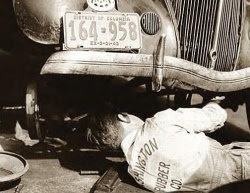 Imagine you're driving along and you hear a sound somewhere under your car. "Ka-chung, ka-chung, ka-chung..." You're going to take that to a mechanic, right?
Imagine you're driving along and you hear a sound somewhere under your car. "Ka-chung, ka-chung, ka-chung..." You're going to take that to a mechanic, right?Now imagine that the mechanic asks you what you want to do about the sound. "I want you to fix it," you tell him.
"Sorry," he's says. "That's not specific enough. I need you to tell me exactly what needs to be done. What component I need to replace. What tools I need to do it. I need step-by-step instructions on exactly what repairs you want done."
"I'm not the mechanic," you answer, "you are! I just want you to fix the noise. I don't know how to do it."
"Come back when you have real solutions," the mechanic says.
That's the problem facing the American people and, specifically, the protesters in the streets of New York and other cities right now. The problem is obvious -- unemployment, a tax structure that's way to lopsided toward those at the top, corporate crime and runaway greed, out-of-control higher education costs, etc. Our entire economic system is going "Ka-chung, ka-chung, ka-chung." Yet, when the protesters point out there's obviously something wrong here, they're dismissed by politicians and the media for having no solutions.
But here's the thing; it's not their job to have solutions. That's what we hire politicians for. In our metaphor, they're the customer, not the mechanic. Yet the media is constantly asking what the customer plans to do about the noise, then snicker behind their hands when the customer shrugs.
Even Paul Krugman comes close to falling into this trap -- before sidestepping it expertly. In an excellent piece on the protests, he praises protesters for correctly identifying the problem and addresses the "no solutions" argument.
A better critique of the protests is the absence of specific policy demands. It would probably be helpful if protesters could agree on at least a few main policy changes they would like to see enacted. But we shouldn’t make too much of the lack of specifics. It’s clear what kinds of things the Occupy Wall Street demonstrators want, and it’s really the job of policy intellectuals and politicians to fill in the details.
Yes. It probably would be better if they came out with wonky policy proposals, but that's what policy wonks are for. As critiques go, "they don't have solutions!" is just plain dumb. Thankfully, he pulls out of the media argument with the last sentence of the paragraph. But this is perilously close to calling the criticism valid.
I've been pushing this a lot lately, but that's because I think it's important; go to We Are the 99%, scroll through a few pages of posts, and see if you don't notice something. That's right, a lot of the stories are extremely similar. There's a big, big problem out there, all of these people are pointing right at it, but the media are pretending -- completely illogically -- that if you don't know how to fix it, the problem must not exist.
The Washington crowd should not be looking at average Americans for solutions. That's not what we pay them to do. The American people need to tell them what they'd tell that mechanic; we've told you what the problem is, now quit being a dick about it and fix the damned thing.
Or we'll find someone else who will.
-Wisco





